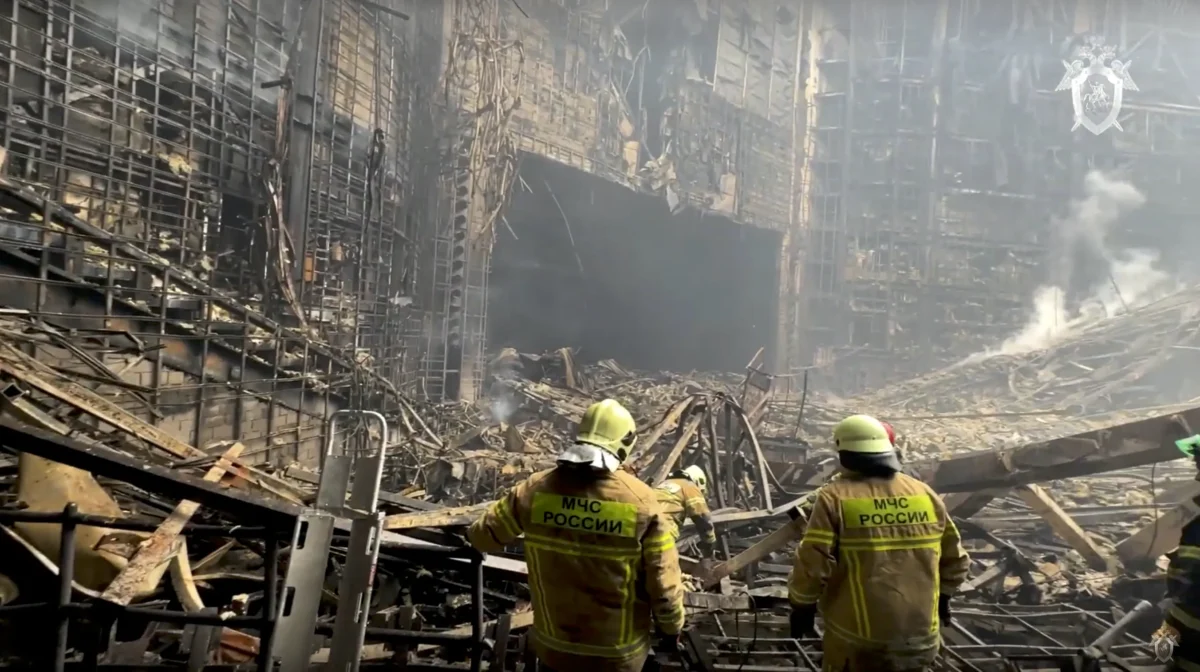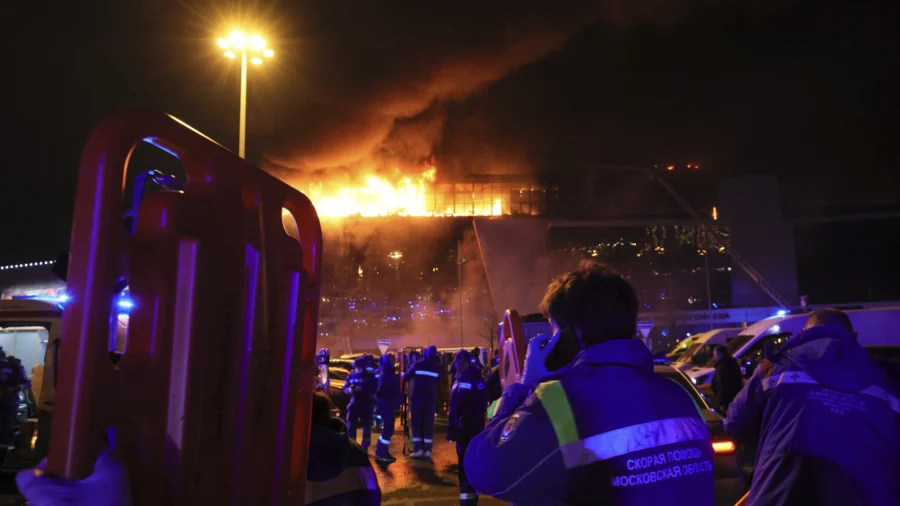Moscow has challenged Washington’s claim that a branch of the so-called Islamic State (ISIS) terrorist group was behind last week’s massive attack in Moscow that left scores of Russian concertgoers dead.
“A question for the White House: Are you sure it was ISIS, or will you change your mind later?” Maria Zakharova, a spokeswoman for Russia’s foreign ministry, said on March 25.
In remarks cited by Russia’s state-run TASS news agency, she claimed that Washington sought to “cover up” its own involvement—and that of its allies in Kyiv—by blaming the deadly incident on the terrorist group.
“The American political engineers have painted themselves into a corner with stories that ISIS carried out the attack,” Ms. Zakharova said.
Washington, she added, sought to “cover itself and its proxy—the [Kyiv] regime—by resorting to the ISIS bogeyman.”
On the evening of March 23, four armed men entered Moscow’s Crocus City Hall and opened fire indiscriminately on crowds at a concert.
By the time the attack was over, at least 137 people lay dead—including several children—and more than 180 were reportedly injured.
The attack is believed to have been the deadliest terrorist incident in Russia in two decades.
According to Russian authorities, 11 men, including the four suspected gunmen, have since been detained in connection with the attack.
Several of the suspects were arrested in Russia’s western Bryansk while allegedly trying to reach the border with next-door Ukraine.
They are currently under interrogation by Russian federal authorities.

Putin Points Finger at Kyiv
Russian officials were quick to blame the attack on Ukraine, eastern portions of which have been subject to an ongoing Russian invasion since early 2022.
In a televised address, Russian President Vladimir Putin alleged that the perpetrators had attempted to flee to Ukraine in the wake of the attack.
“They … moved towards Ukraine, where, according to preliminary data, a window was prepared for them from the Ukrainian side to cross the state border,” Mr. Putin asserted, without providing evidence.
Kyiv, for its part, vehemently denies any role in the incident.
“It would be both cynical and counterproductive for Russia—and the security of its citizens—to use this as a pretext against Ukraine,” Ukrainian President Volodymyr Zelenskyy said in a video message.
Within hours of the attack, Washington appeared to rule out Kyiv’s involvement, claiming to have intelligence confirming that ISIS was responsible.
Adrienne Watson, a spokeswoman for the White House National Security Council, said that U.S. officials had warned their Russian counterparts earlier this month of a “planned terrorist attack in Moscow potentially targeting large gatherings.”
The information, she said, had “prompted the State Department to issue a public advisory to Americans in Russia.”
“The U.S. government also shared this information with Russian authorities in accordance with its longstanding ‘duty to warn’ policy,” Ms. Watson added.
A U.S. official cited by Reuters appeared to blame the attack on an ISIS affiliate known as ISIS-Khorasan (ISIS-K), which is said to have emerged in Afghanistan a decade ago.
In late 2022, ISIS-K reportedly claimed responsibility for an attack on Russia’s embassy in Kabul that left six people dead, including two embassy employees.
In early January, ISIS claimed responsibility for two suicide bombings that left scores dead in Iran’s southeastern city of Kerman.
At the time, Reuters, citing U.S. intelligence sources, reported that intercepted communications had confirmed ISIS-K’s role in the attack—which was the deadliest in Iran’s modern history.
Last week, the same group claimed responsibility for a suicide bombing in the Afghan city of Kandahar that killed three people, according to local sources.
ISIS has also since claimed responsibility—via its Amaq news agency—for last week’s deadly attack in Moscow, also releasing video footage purportedly showing the attack in progress.
On March 25, France joined the United States in claiming to have intelligence indicating that the Moscow attack had been perpetrated by ISIS.
“The information available to us … and our main partners, indicates indeed that it was an entity of the Islamic State that instigated this attack,” French President Emmanuel Macron told reporters.
ISIS ‘Still Threat,’ US Envoy Says
Said to be an offshoot of al-Qaeda, ISIS overran vast swathes of Syria and Iraq in 2014.
By 2019, the group had been largely eradicated by U.S.-led forces and the Russian military, the latter of which has worked alongside the Syrian army since 2015.
Some 2,500 U.S. troops remain in Iraq (with another 900 in Syria) as part of an international coalition ostensibly tasked with preventing the group’s resurgence.
U.S. forces deployed in Iraq remain in the country based on an agreement with Baghdad.
A day after the Moscow attack, Alina Romanowski, U.S. ambassador to Iraq, insisted that ISIS continues to pose a serious threat.
“ISIS is still a threat here [in Iraq],” she told Reuters, while conceding the group had been “much diminished.”
“As this event [in Moscow] reminds us, ISIS is a common terrorist enemy that must be defeated everywhere,” Ms. Romanowski said.
But leading Iraqi politicians, including Prime Minister Mohammed al-Sudani, have taken issue with this assertion, saying the group no longer poses a significant threat and that the U.S.-led coalition is no longer necessary.
After a recent series of U.S. strikes on “terrorist” targets inside Iraq, a spokesman for Mr. Al-Sudani claimed that the coalition had become “a factor for instability.”
In January, Mr. Al-Sudani stated his “firm position on ending the international coalition [in Iraq] now that the justification for its existence has ended.”
In her latest comments, Ms. Zakharova, the Russian Foreign Ministry spokeswoman, claimed that repeated U.S. interventions in the Middle East had led to the emergence of terrorist groups.
She went on to accuse Washington of fostering what she described as “controlled chaos” in the region through the use of terrorist proxies.
The Epoch Times requested comment from the U.S. State Department regarding the Foreign Ministry spokeswoman’s claims but received none by press time.
Reuters contributed to this report.
From The Epoch Times


